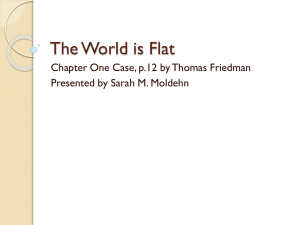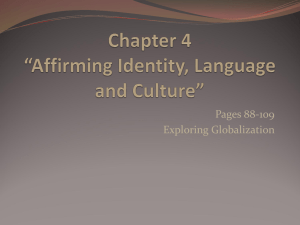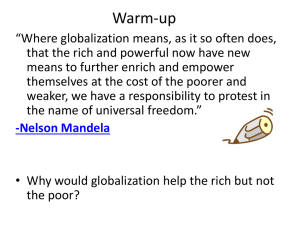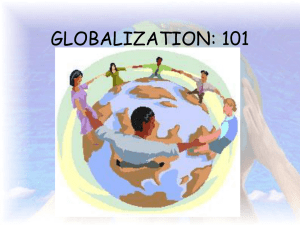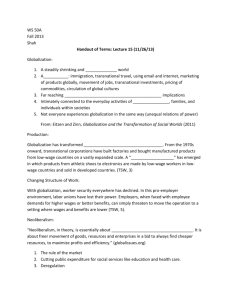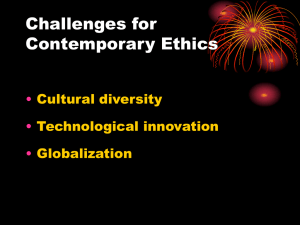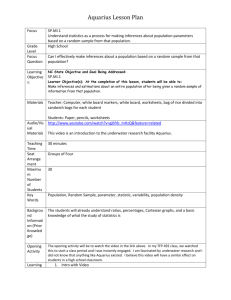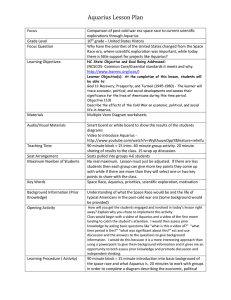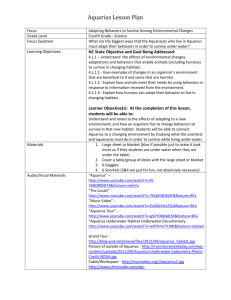21st Century Global Geography
advertisement
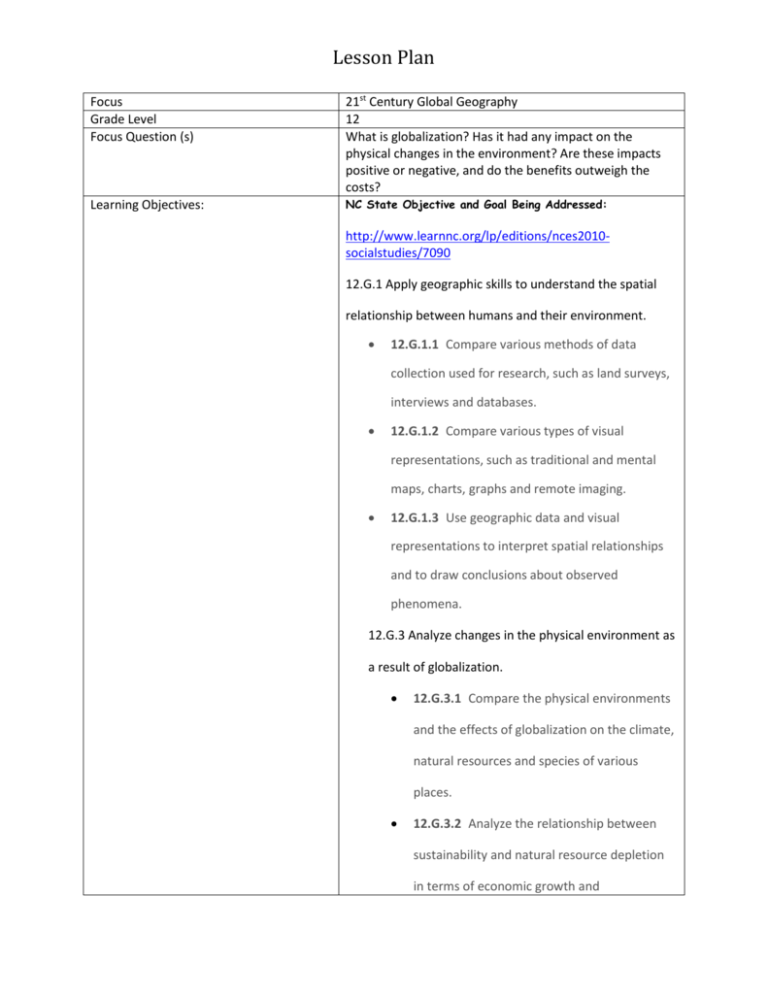
Lesson Plan Focus Grade Level Focus Question (s) 21st Century Global Geography 12 What is globalization? Has it had any impact on the physical changes in the environment? Are these impacts positive or negative, and do the benefits outweigh the costs? Learning Objectives: NC State Objective and Goal Being Addressed: http://www.learnnc.org/lp/editions/nces2010socialstudies/7090 12.G.1 Apply geographic skills to understand the spatial relationship between humans and their environment. 12.G.1.1 Compare various methods of data collection used for research, such as land surveys, interviews and databases. 12.G.1.2 Compare various types of visual representations, such as traditional and mental maps, charts, graphs and remote imaging. 12.G.1.3 Use geographic data and visual representations to interpret spatial relationships and to draw conclusions about observed phenomena. 12.G.3 Analyze changes in the physical environment as a result of globalization. 12.G.3.1 Compare the physical environments and the effects of globalization on the climate, natural resources and species of various places. 12.G.3.2 Analyze the relationship between sustainability and natural resource depletion in terms of economic growth and Lesson Plan development. 12.G.3.3 Explain how places are influenced by human perception and modification of the environment. 12.G.3.4 Evaluate the extent to which preservation and conservation efforts impact local, national and global economies. Audio/Visual Materials Teaching Time Seat Arrangement Maximum Number of Students Key Words Aquarius Reef Base website. Let them read the overview that explains what they do. http://aquarius.uncw.edu/ Youtube video we saw in class that shows the scientists in the actual Aquarius. http://www.youtube.com/nurcbase/ Smart boards/projectors- notes. 1 class period Groups of 3 or 4 25 Globalization, environment, relationship, direct result Background Information (Prior Knowledge) Students should already have a working understanding of the effects that humans have on their environment. Opening Activity Start off with the definition of globalization on the board, then ask the students to write down what they think globalization is, and whether or not it has had any effect on the physical environment around us. Go over responses after 10 minutes or so. Use a projector/smartboard to give the students a basic overview on globalization, how it has developed throughout time, and what it really means to be a ‘globalized’ nation. Give both pros and cons of globalization including the detrimental effects that progress both agriculturally and industry-wise have had on our environment (pesticide runoff, greenhouse gas emissions etc.). After taking questions etc. show students the Aquarius website, as well as the Youtube video of the scientists and explain that this is a new innovative way that scientists have found to monitor some of the effects of globalization on marine life, and how to go about rectifying the detrimental effects on marine life that have occurred. Learning Procedure ( Activity) Connections to Other Subjects Science! Lesson Plan Closing Activity and Assignment Assessment Other Links and Resources Have the students work together in their small groups to discuss whether or not projects like Aquarius are worthwhile endeavors, and create a presentation due by the next class period on what ‘globalized’ nations should be doing with their technology, money etc. to give back to the environment, as well as come up with another endeavor (using Aquarius as a model) that governments can help better protect the environment, and why is it that it is their responsibility to do so? The presentation should be no longer than 8 minutes, have some sort of power point/digital component and address: whether or not the environmental impact of globalization is a real issue that needs to be dealt with, why or why not? What should be done to fix it if it is? If the students believe that globalization’s environmental impact is a non-issue or that the benefits of globalization outweigh the costs, what do they believe to be the real cause of our current environmental issues? Is it the government’s duty to protect the environment? Students should present a plausible solution/project (like Aquarius) that can be done to curb and/or reverse the detrimental effects of globalization and/or whatever is negatively impacting our environment at the moment. I will assess my students by asking questions of them throughout my lesson, as well as encouraging them to ask questions several time throughout my lesson. How their presentations turn out will be another way in which I can assess how well they retained/understood the information that I taught them. The students’ presentations will be assessed by their peers- who will answer the following questions: Was the idea plausible? Would it be beneficial to the environment? Does it have any negative drawbacks? Why would this idea be a worthwhile project for government funding? By having the students assess each other, and reading their answers I will have a greater understanding on whether or not my students understood what I wanted out of the assignment. I will grade the projects on their completion, peer evaluations of group mates (did everyone play and equal role?), and the creativity of the idea. This assignment is meant more to assess whether or not the students comprehend globalization and both its positive and negative impacts rather than their ability to create a complete, real and fully functional solution to the world’s environmental issues in a class period. After asking questions and reviewing projects and the peer assessments I can go from there whether the students can be tested on the material, it needs more review, or I can move on to the next topic. http://www.learnnc.org/lp/editions/nces2010socialstudies/7090 http://aquarius.uncw.edu/ http://www.youtube.com/nurcbase/ Lesson Plan


